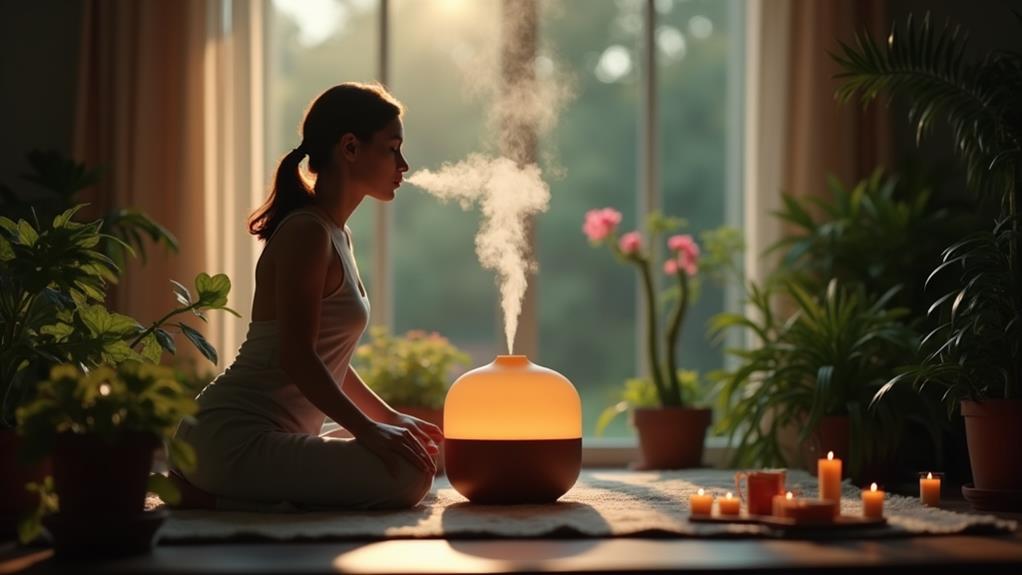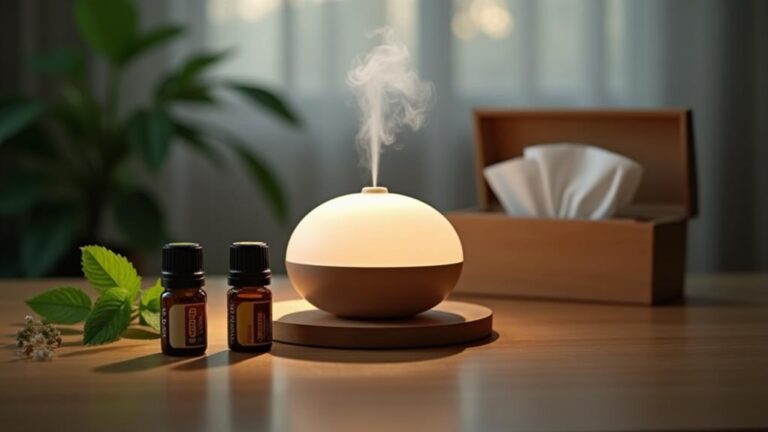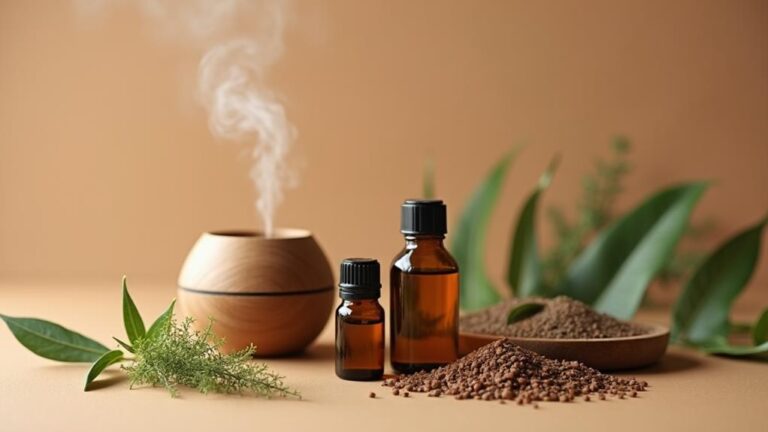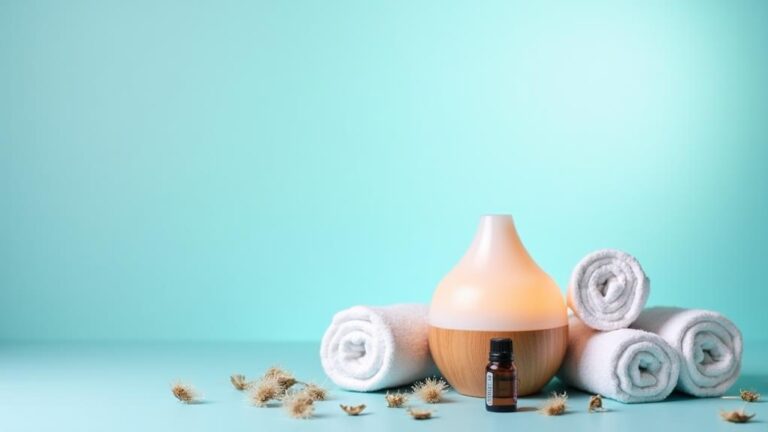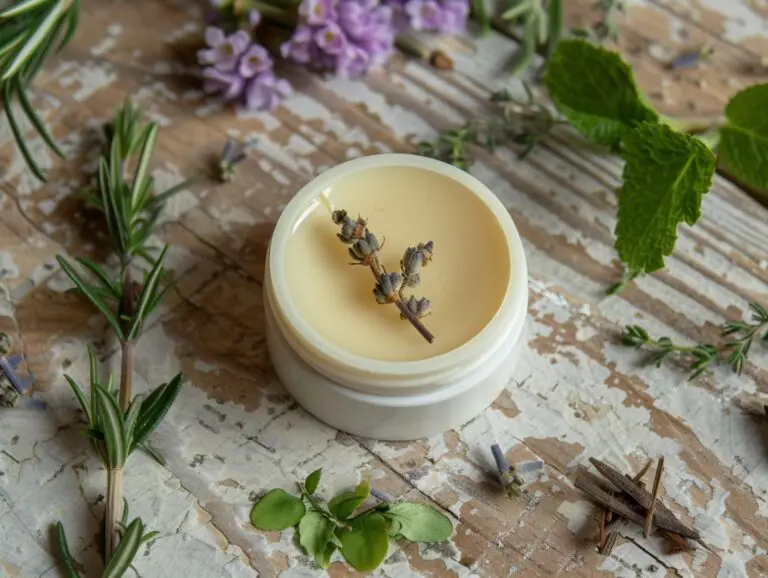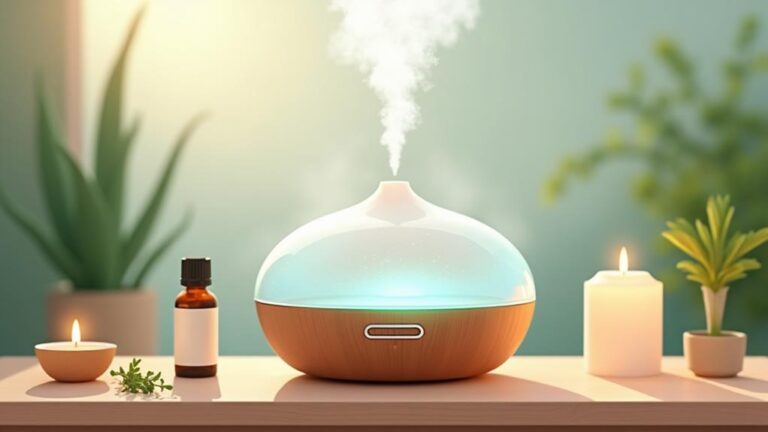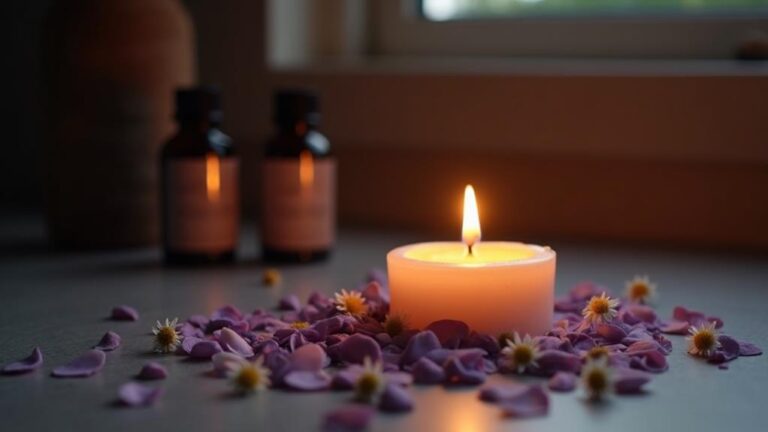As you struggle to find relief from allergy symptoms, you might be surprised to learn that aromatherapy can be a game-changer. By harnessing the power of essential oils, you can reduce inflammation, ease congestion, and soothe irritated skin. But which oils are most effective, and how can you incorporate them into your daily routine? With so many options available, it is crucial to understand how to create custom blends that target your specific allergy triggers. Will you find the sweet spot of relief with eucalyptus, peppermint, or lavender?
Key Takeaways
- Aromatherapy offers a natural solution to combat allergy-related discomfort and promote overall well-being.
- Essential oils like eucalyptus, lavender, and peppermint have properties that alleviate specific allergy symptoms.
- Custom blends of essential oils can provide tailored relief for common allergy triggers like pollen, dust mites, and mold.
- Aromatherapy targets underlying causes of allergies, unlike conventional treatments that focus on symptom suppression.
- Incorporating aromatherapy into daily routines can prioritize well-being and allergy relief, reducing symptoms and promoting relaxation.
How Aromatherapy Relieves Allergies
Many allergy sufferers have found relief through aromatherapy, and you can too. This holistic approach harnesses the power of scents to alleviate symptoms and promote overall well-being.
Aromatherapy benefits extend beyond mere relaxation, offering a natural solution to combat allergy-related discomfort. By inhaling specific essential oils, you can tap into the scent therapy potential to reduce inflammation, ease congestion, and soothe irritated skin.
As you explore the world of aromatherapy, you'll discover that different scents have unique properties that can help alleviate specific allergy symptoms.
For instance, eucalyptus oil is known for its decongestant properties, while peppermint oil can help calm itchiness and hives.
By incorporating aromatherapy into your daily routine, you can experience relief from the constant sniffles, sneezes, and itchy eyes associated with allergies.
With its natural and non-invasive approach, aromatherapy offers a promising solution for those seeking an alternative to conventional medications.
Essential Oils for Allergies
As you explore into the world of aromatherapy for allergy relief, you'll likely want to know which essential oils to turn to for support. When it comes to allergies, certain essential oils have been found to provide relief due to their unique properties. These scented remedies can help alleviate symptoms and promote overall well-being.
| Essential Oil | Essential Properties |
|---|---|
| Lavender | Anti-inflammatory, calming, and soothing |
| Eucalyptus | Decongestant, anti-inflammatory, and antimicrobial |
| Peppermint | Cooling, invigorating, and decongestant |
| Tea Tree | Antimicrobial, anti-inflammatory, and antifungal |
When choosing an essential oil for allergy relief, consider the specific symptoms you're experiencing. For example, if you're struggling with congestion, eucalyptus oil may be a good choice due to its decongestant properties. If you're experiencing skin irritation, tea tree oil's antimicrobial properties may provide relief. By incorporating these essential oils into your aromatherapy routine, you can find natural, holistic relief from allergy symptoms.
Benefits of Aromatherapy
Holistic balance is a delicate state, one that aromatherapy can help you achieve by providing natural relief from allergy symptoms.
By incorporating essential oils into your daily routine, you can experience the numerous benefits of aromatherapy. This holistic approach not only alleviates physical discomfort but also promotes Mental Clarity and Emotional Balance.
As you breathe in the invigorating scents of essential oils, your mind and body begin to relax, reducing stress and anxiety.
Aromatherapy's benefits extend beyond just symptom relief.
It can also boost your mood, improve sleep quality, and increase focus. By achieving a state of balance, you'll find that you're better equipped to handle life's challenges.
Your Emotional Balance will be restored, allowing you to respond to situations more calmly and rationally.
As you experience the benefits of aromatherapy, you'll discover that it's not just a treatment for allergies, but a path to overall wellness.
Common Allergy Triggers
Identifying the root cause of your allergies is key to finding relief.
Understanding what triggers your allergy symptoms is essential in making lifestyle changes to alleviate your suffering.
Common allergy triggers include:
- Pollen: From trees, grasses, and weeds, pollen is a common allergen that causes symptoms like congestion, itchiness, and sneezing.
- Dust mites: These tiny insects live in bedding, carpets, and upholstered furniture, and their waste products can trigger allergic reactions.
- Mold: Fungi that grow in damp environments can cause allergy symptoms like coughing, sneezing, and itchy eyes.
- Pet dander: The skin flakes from dogs, cats, and other animals can trigger allergic reactions in some people.
Aromatherapy Vs Conventional Treatments
While traversing the world of allergy relief, you've likely encountered a multitude of treatment options. From over-the-counter medications to prescription drugs, conventional treatments often dominate the conversation. However, aromatherapy research has shown promising results in providing relief from allergy symptoms. So, how does aromatherapy stack up against conventional treatments?
When comparing treatment options, it's vital to take into account the root causes of allergies. Conventional treatments often focus on symptom suppression, whereas aromatherapy targets the underlying causes.
By addressing stress, anxiety, and inflammation, aromatherapy can provide a more holistic approach to allergy relief. Treatment comparisons have shown that aromatherapy can be just as effective as conventional treatments in reducing symptoms, without the potential side effects.
In fact, studies have demonstrated that essential oils like lavender and peppermint can reduce inflammation, alleviate congestion, and promote relaxation. By incorporating aromatherapy into your treatment plan, you may find a more natural and sustainable solution to managing your allergies.
Best Essential Oils for Relief
When you're seeking natural allergy fighters, you'll want to turn to essential oils that have anti-inflammatory and antihistamine properties.
Certain essential oils, such as peppermint, eucalyptus, and lavender, have been shown to provide instant relief from allergy symptoms.
Natural Allergy Fighters
Harnessing the power of essential oils can be a game-changer for allergy sufferers.
You can breathe a sigh of relief with the help of natural allergy fighters that provide a holistic approach to combating those pesky pollen particles.
Some of the top essential oils that can help alleviate allergy symptoms:
- Lemon oil: Known for its natural antihistamine properties, lemon oil can help reduce inflammation and ease congestion.
- Peppermint oil: This invigorating oil can help open up airways, making it easier to breathe, and also has natural anti-inflammatory properties to reduce swelling.
- Eucalyptus oil: A natural decongestant, eucalyptus oil can help relieve sinus pressure and reduce pollen reduction.
- Roman chamomile oil: This soothing oil can help calm irritated skin and eyes, reducing the overall discomfort associated with allergies.
Essential Oil Blends
You've got a solid foundation of individual essential oils to combat allergy symptoms, now it's time to explore the power of blending them for even greater relief.
Essential oil blends can create aromatic synergy, where the combined effects of each oil surpass those of individual oils. This synergy can lead to more effective and longer-lasting relief from allergy symptoms.
When blending essential oils, it's crucial to understand the art of blending techniques.
Start by selecting oils with complementary properties, such as peppermint's cooling effect and eucalyptus's decongestant properties. Then, experiment with different ratios of each oil to find the perfect blend for your specific needs.
You can also use pre-made blends, such as "AllergyEase" or "Respiratory Relief," which combine the benefits of multiple oils in one convenient formula.
Using Aromatherapy Diffusers
You'll want to select a diffuser that fits your lifestyle and space, whether it's a compact ultrasonic model for your nightstand or a nebulizing diffuser for a larger area.
As you explore different essential oil combinations, consider blending calming lavender with uplifting eucalyptus to ease allergy symptoms. By choosing the right diffuser and essential oil blends, you can create a personalized aromatherapy routine that brings you relief and relaxation.
Choosing the Right Diffuser
With aromatherapy becoming an integral part of your allergy relief routine, selecting the right diffuser is crucial to optimize its benefits.
You want a device that complements your lifestyle and promotes a healthy, balanced environment.
When choosing a diffuser, consider the following factors:
- Diffuser Placement: Will you be using it in a small room or a large open space? Some diffusers are designed for specific room sizes, so choosing the right one is imperative to your needs.
- Noise Level: Do you prefer a quiet, whisper-soft operation or don't mind a gentle hum? Some diffusers are designed to be ultra-quiet, while others might be more noticeable.
- Mist Output: Do you prefer a strong, continuous mist or a more subtle, intermittent release? Different diffusers offer varying mist output levels, so think about what works best for you.
- Ease of Use: How important is convenience to you? Look for a diffuser with a user-friendly design, easy cleaning, and minimal maintenance.
Essential Oil Combinations
By incorporating essential oil combinations into your aromatherapy routine, you're taking a significant step towards tailored allergy relief.
When using aromatherapy diffusers, blending essential oils can be a game-changer. However, it's vital to prioritize oil safety to avoid any adverse reactions. Always dilute your essential oils in a carrier oil, and start with small amounts to test your sensitivity.
When creating blend recipes, consider the specific allergens you're targeting.
If you're allergic to pollen, a combination of peppermint, eucalyptus, and lavender oils may provide relief. These oils have natural decongestant and anti-inflammatory properties that can help alleviate symptoms like congestion and itchiness.
If you're allergic to dust mites, a blend of tea tree oil, lemon oil, and geranium oil may be more effective.
Remember to research each oil's properties and potential interactions before creating your custom blend. By doing so, you'll be well on your way to experiencing the benefits of aromatherapy for allergy relief.
Experiment with different recipes, and don't be afraid to adjust them based on your body's response.
Aromatherapy and Sinus Relief
Sinus pressure and congestion can be debilitating, disrupting daily life and leaving you feeling sluggish and fatigued.
You're not alone – sinus infections and nasal congestion affect millions of people worldwide.
Aromatherapy offers a natural, holistic approach to finding relief from these symptoms.
To alleviate sinus pressure and congestion, try incorporating these essential oils into your routine:
- Eucalyptus oil: Known for its decongestant properties, eucalyptus oil helps to open up airways and reduce nasal congestion.
- Peppermint oil: Invigorating and revitalizing, peppermint oil helps to clear sinuses and ease sinus pressure.
- Tea tree oil: With its antimicrobial properties, tea tree oil can help combat sinus infections and promote healthy sinuses.
- Rosemary oil: This herbaceous oil helps to reduce inflammation and improve sinus function.
Creating Custom Aromatherapy Blends
You've discovered the benefits of essential oils for sinus relief, and now you're ready to take your aromatherapy practice to the next level by creating custom blends tailored to your specific needs. This is where blending techniques come in.
By combining different essential oils, you can create unique synergy that amplifies their individual benefits. Oil synergy is the key to releasing the full potential of aromatherapy. When you blend oils, you're not just adding their individual effects – you're creating a new, enhanced whole.
To create a custom blend, start by identifying the specific benefits you're looking for, such as decongesting, anti-inflammatory, or calming properties. Choose essential oils that align with your goals, and experiment with different ratios to find the perfect balance.
Consider the top, middle, and base notes of each oil, as these will affect the overall scent and character of your blend. Don't be afraid to try new combinations and adjust them as needed. With practice and patience, you'll develop your own unique aromatherapy blends that provide targeted relief for your allergies and sinus issues.
Integrating Aromatherapy Into Lifestyle
You can seamlessly integrate aromatherapy into your daily routine by incorporating simple practices, such as using a morning pick-me-up blend in your shower or adding a calming essential oil to your bedtime ritual.
Daily Routine Tips
As you start your day, the morning light pouring through your window can be a gentle reminder to prioritize your well-being.
By incorporating aromatherapy into your daily routine, you can set yourself up for a day of comfort and relief from allergies.
To get started, try these simple tips:
- Morning routine: Begin by adding a few drops of your chosen essential oil to your diffuser or inhaling it directly from a cloth or handkerchief. This can help increase your energy and mental clarity.
- Incorporate aromatherapy into your daily commute: Add a few drops of essential oil to your car's air vent or wear a scarf infused with your chosen oil to combat stress and congestion.
- Take breaks throughout the day: Take short breaks to inhale your essential oil or apply it topically to your pulse points to reduce stress and anxiety.
- Evening protocol: Wind down before bed by using a calming essential oil in your diffuser or applying it to your skin to promote relaxation and restful sleep.
Essential Oil Blends
Essential oil blends offer a powerful way to integrate aromatherapy into your lifestyle, providing a customizable approach to address specific health concerns, including allergies. By mixing essential oils, you can create unique aromatic profiles that cater to your individual needs. This flexibility allows you to target specific allergy symptoms, such as congestion or itchiness, and create a personalized remedy.
When creating essential oil blends, consider the following combinations:
| Essential Oil | Benefits |
|---|---|
| Lavender + Peppermint | Reduces stress and opens airways |
| Eucalyptus + Tea Tree | Combats congestion and soothes skin |
| Geranium + Bergamot | Balances hormones and uplifts mood |
| Frankincense + Lemon | Reduces inflammation and boosts immunity |
| Roman Chamomile + Ylang-Ylang | Calms anxiety and promotes relaxation |
Frequently Asked Questions
Can I Use Aromatherapy if I Have Sensitive Skin or Allergies to Essential Oils?
When exploring new skincare routines, you should always patch test products, especially if you have sensitive skin or allergies, as certain ingredients can trigger reactions; essential oils are no exception, so proceed with caution to identify potential allergy triggers.
How Often Should I Use Aromatherapy for Optimal Allergy Relief Results?
Just like a garden needs regular watering, your body needs consistent aromatherapy sessions to reap benefits. Aim for 2-3 times a week, rotating essential oils every 7-10 days to avoid sensitization, and adjust frequency based on your unique response to optimize allergy relief.
Can Children and Pets Use Aromatherapy for Allergy Relief Safely?
When considering natural remedies for your little ones, you'll want to exercise caution; for kids and pets, it is crucial to follow Child Dosing guidelines and take Pet Safety Precautions to guarantee their safe use of aromatherapy for allergy relief.
Are There Any Potential Interactions With Medication When Using Aromatherapy?
As you navigate the ancient apothecary of natural remedies, beware: certain essential oils can interfere with your meds, particularly those affecting Hormone Regulation or Blood Thinner medications, so it's vital you consult with a healthcare pro before blending your therapy.
Can I Use Aromatherapy in Combination With Other Natural Allergy Remedies?
You can combine aromatherapy with other natural remedies, like herbal combinations and dietary supplements, to enhance their effects. Just guarantee you're not overdoing it, and consult a healthcare pro to avoid any adverse interactions or reactions.
Conclusion
As you breathe in the soothing scents of aromatherapy, imagine your body surrendering to a tranquil haven, where allergy symptoms fade like whispers in the wind. By embracing this natural approach, you're not just alleviating discomfort, but nourishing your entire being. So, take a deep breath, and let the essence of aromatherapy envelop you in a cocoon of comfort, freeing you to live life to the fullest, unencumbered by the shackles of allergy woes.


